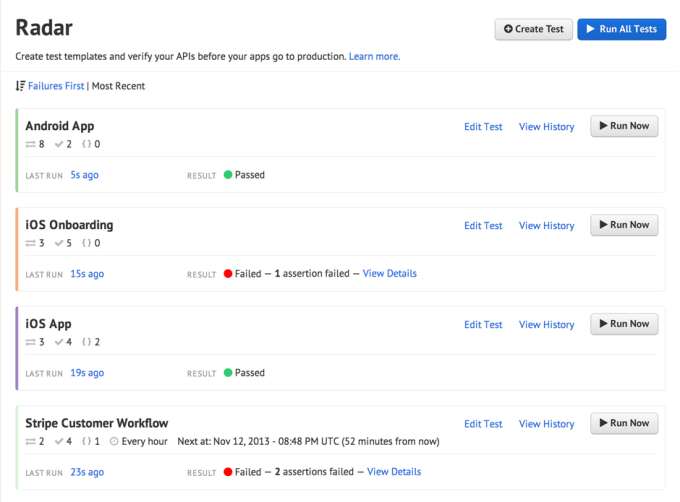Runscope, a service that helps developers test and debug APIs, today announced that it has raised $6 million in a Series A funding round led by General Catalyst Partners, with participation from Lerer Ventures and True Ventures. As part of this investment, General Catalyst Managing Director Steve Herrod will join the company’s board of directors.
True Ventures led Runscope’s $1.1 million seed round in early 2013. Lerer Ventures also participated in that round. Since raising this seed round, it launched Radar, its flagship product for testing backend services. The company plans to use its new funding round to grow its team and expand its product line into the enterprise. As Runscope’s CEO and co-founder John Sheehan tells me, the company also plans to expand its marketing efforts to reach more developers and will likely hire a head of marketing soon, too.

Runscope says “tens of thousands of developers” have used its tools so far. In total, the service has captured more than 50,000,000 requests to over 10,000 unique APIs.
With Runscope Enterprise, which the company also announced today, large companies will be able to bring the service’s API debugging and testing tools behind their firewalls or to use a hybrid approach. Runscope argues that now that API use within large companies is “at an all-time high thanks to mobile apps, microservices and a new generation of REST-based service-oriented architecture,” many of them will also have a need for its services. According to Runscope, the Enterprise version is specifically tailored to handle high-volume, internal API consumption.
Runscope Enterprise is launching in limited private preview with a select number of companies today. Over the coming months, the company expects to open the service up to more users. First, though, the team needs to add features like single sign-on and data-retention policies to the service.
As many SaaS companies have discovered in the last few years, selling to enterprise companies is often a far easier proposition than trying to build a businesses by getting individual startups and developers to sign up for a subscription.